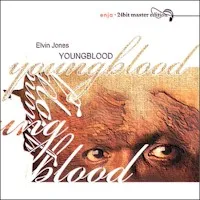Size: 108,7 MB
Time: 46:43
File: MP3 @ 320K/s
Released: 2016
Styles: Jazz Fusion, Vocals
Art: Front
01. Fresh Money (5:10)
02. Chili Pepper (3:56)
03. In The Same Place (5:55)
04. The Bean Song (2:57)
05. Fu Man Shu (5:32)
06. Graduation (3:34)
07. You Don't Know (4:38)
08. It Gets Back To You (4:22)
09. Como Se Llama Mama (5:03)
10. Everything You Got To Give (5:31)
Jazz music percussionist, vocalist, composer, New York City-based Eric Frazier Eric Frazier celebrates the release of his eighth jazz CD, In The Same Place which features ten original compositions in an eclectic mix of Jazz, Blues, R&B, Reggae, Spoken Word, Salsa, captivating storytelling and lyrics. Accompanying Mr. Frazier – who is the creator of the Fort Greene Park Jazz Festival and has been featured in an array of jazz publications including Jazz Inside Magazine, Jazz Improv and more – are a stellar group of New York jazz musicians including Pamela Cornelius, vocals, Danny Mixon, piano; Yoichi Uzeki, piano, Gene Ghee, tenor sax; Paul Beaudry, bass; Lonnie Plaxico, bass; Charles Bartlett, trumpet, and Dwayne “Cook” Broadnax, drums. Cadence Magazine wrote: “Eric’s music is upbeat, fun, and inspiring. You can’t help but snap your fingers, bob your head, dance or sing along with the catchy tunes”
Growing up in Harlem and Brooklyn, Eric Frazier eventually earned a Doctorate from Columbia University. Frazier emerged onto the New York music scene after transitioning from a career as a school Principal and Education Executive to follow his passion for music and storytelling. Initially, immersing himself in playing Conga Drum, Djembe Drum and African Dance, he has expanded his artistic endeavors to singing, trap drums, and inspired by his brother Gary Ellis Frazier, who was formerly with The Alvin Ailey Dance Company, he has expanded to tap dance. Eric Frazier’s recordings are characterized by a range of styles from Jazz, Swing, BeBop, Salsa, R&B, Calypso, Blues, Broadway, Reggae, Reggaeton, World Music and Afro beat.
Over the past decade, Frazier has been very active on the New York jazz scene, and built an impressive list of credits including performances or recordings with Reggie Workman, Robin Kenyatta, Carlos Garnett, Bill Saxton, Stanley Banks and Danny Mixon, Pharaoh Sanders, Jack McDuff and more. His own his recordings have featured notable jazz artists including Jeremy Pelt, Anthony Wonsey, Wayne Escoffery and Maurice Brown. He has performed at leading jazz clubs and venues in New York including the Rainbow Room, Madison Square Garden Theater, Iridium Jazz Club, Brooklyn Academy of Music, Birdland, and The Apollo Theater among others, and has also led his group at noteworthy jazz venues and festivals throughout the United States. In addition to appearances performing on an array of music and jazz TV shows, including spots on BET Jazz Discovery and Bet On Jazz Cable TV shows, Eric Frazier is the co-host of WLIU Jazz radio 88.1 FM, and the creator of the Fort Greene Park Jazz Festival, at which he will appear from 3 to 7PM, Saturday, July 23, 2016 & October 10, 2016. He has written books of poetry, scholarly articles, jazz columns, publications and letters, has spoken at numerous colleges and universities, and is available for lectures, workshops and presentations.
MC
Ziddu



















